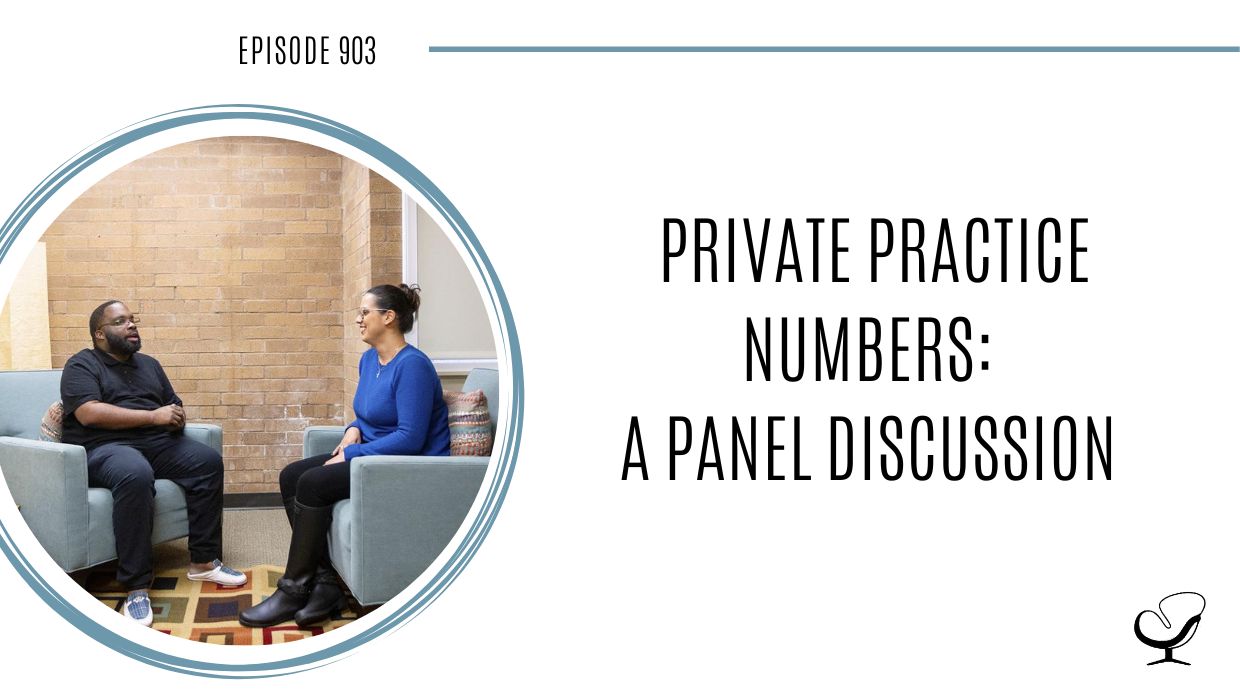Podcast: Play in new window | Download | Embed
How do other therapists deal with insurance? How do your colleagues in mental health feel about raising their rates? How can you overcome fee fears and begin to charge your worth?
In this podcast episode, Joe Sanok and fellow panelists discuss numbers in private practice.
Podcast Sponsor: Therapy Notes

As a therapist, I can tell you from experience that having the right EHR is an absolute lifeline. I recommend using TherapyNotes. They make billing, scheduling, notetaking, telehealth, and E-prescribe incredibly easy. Best of all, they offer live telephone support that’s available 7 days a week.
You don’t have to take my word for it – Do your own research and see for yourself – TherapyNotes is the #1 highest-rated EHR system available today, with 4.9 out of 5 stars on Trustpilot.com and on Google.
All you have to do is click the link below, or type promo code JOE on their website www.therapynotes.com, and receive a special 2-month trial, absolutely free.
If you’re coming from another EHR, TherapyNotes will import your demographic data quickly and easily at no cost, so you can get started right away.
Trust me, don’t waste any more of your time, and try TherapyNotes.
In This Podcast
-
- Overcoming impostor syndrome
- Raising rates
- Taking insurance
- Charging your worth
Overcoming impostor syndrome
Every professional – especially therapists – often struggle with impostor syndrome, or feeling doubtful of their skills or expertise at one point or another. These feelings are especially strong when it comes to raising and setting rates.
Leaning into that fear, sitting with the uncomfortable feelings – like what we ask of our clients – [which] allowed me to push that further. (Panelist)
It is important to push through these fears and address them, face them, and trust the process. These feelings are normal, but they are not fact, and they can be changed and approached differently.
Sometimes you’re holding onto the seat of your pants, like, “Where do I set my rates? Can I actually make that ask? Can I just say this? Do I have that confidence, that belief in myself that I’m worth that?” and in the second year you start to settle in [and say], “Yeah, I can actually do this. This is working, I’ve got some good things going on”. (Panelist)
Usually in the third year of private practice, most therapists have shed their nervousness and uncertainty. They know their worth, they know who their ideal clients are, and they know where they want to grow and upskill. If you are still on the journey, know that you can develop yourself this way. There is help and guidance available to you, and it can be done.
Raising rates
Raising your rates is an important part of your private practice to keep the business running as well as keeping yourself successful. Of course, you can offer financial support for a handful of clients that you know need extra support, but on the whole, you must charge for your hours because you have invested your life, your money, and your passion into this. It is fair to charge for it.
Taking insurance
If you do take insurance, get a biller to handle the insurance. Instead of spending your time chasing insurance to pay you or following up with late payments, you can hire a biller to do that for you. Some therapists have tried to get into insurance panels but it was more frustrating than they had realized. So, decide what works for you and go for it. It doesn’t matter if it looks different from your fellow practice owners – you need to do what works for you and for your business.
Charging your worth
By the time you get fully licensed, you’ve put in ten thousand hours worth of investment of your life … forget the monetary value of what it costs to do grad school and everything else, you’ve invested ten thousand hours of your life to being an expert in this field and that’s just getting started without those additional trainings … So yeah, value matters. (Panelist)
You have invested both your time and money into getting to where you are. You need to charge your worth because you have invested a lot into getting to where you are. As a mental health practitioner, you may feel bad for charging a high rate for your hours, and if you want to you can offer some people a payment plan or a reduced rate, but keep it minimum. You need to respect your time, energy, and investment into where you are and ask for payment accordingly.
Sponsors Mentioned in this episode:
-
- Trust me, don’t waste any more of your time, and try TherapyNotes.
- Level Up Your Practice!
Useful links mentioned in this episode:
Check out these additional resources:
-
- Apply to work with us — a decision-making matrix for your next steps
Meet Joe Sanok

Joe Sanok helps counselors to create thriving practices that are the envy of other counselors. He has helped counselors to grow their businesses by 50-500% and is proud of all the private practice owners who are growing their income, influence, and impact on the world. Click here to explore consulting with Joe.
Thanks For Listening!
Feel free to leave a comment below or share the social media below!

